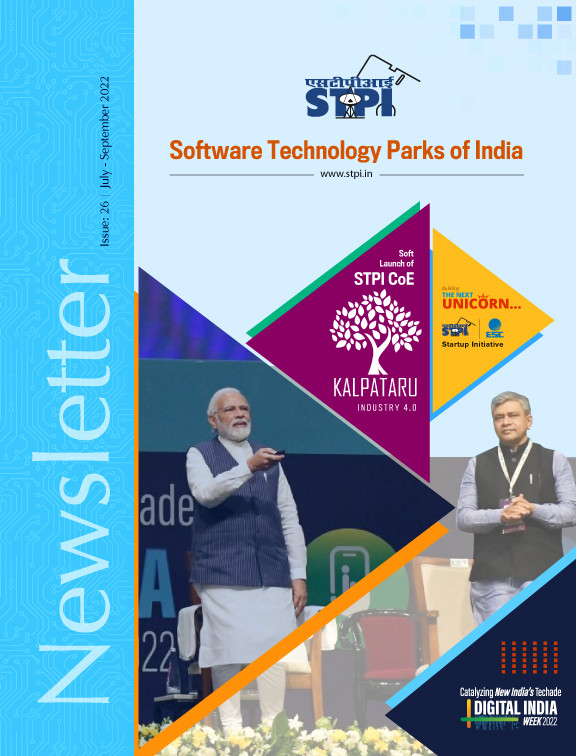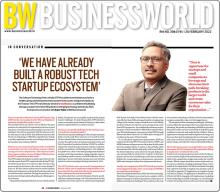Space startups, space parks and satellite manufacturing services will play a major role in boosting the Indian space economy, which is projected to grow to $12.8466 billion by 2025.
A joint report by Ernst & Young (EY) and the Indian Space Association (ISpA) states that by 2025, launch services will be the fastest growing segment in the Indian space economy. The image shows ISRO's heaviest rocket LVM3 launching OneWeb satellites ( Image Source : Twitter/@ISRO) )
India is ushering in a new era in space, due to the efforts of the Indian Space Research Organisation (ISRO), reforms in the commercial space sector, and the emergence of deep space tech startups. Skyroot Aerospace, AgniKul Cosmos, Pixxel, Dhruva Space, SpaceKidz India, Bellatrix Aerospace, Aantriksh, Astrogate Labs, Kawa Space, Blue Sky Analytics, Vellon Space, and SatSure are some of the Indian space tech startups aiming to bring a revolution in the space sector.
Earlier this month, Prime Minister Narendra Modi, announced the 'iDEX 75 Space Challenges' during the Defence Expo, to encourage and promote space tech startups. Engaging with this initiative, the India Space Congress 2022 (ISC 2022) has partnered with Microsoft to extend the benefits of Founders Hub, a platform to support entrepreneurs and provide them with technology and tools, to 15 shortlisted startups.
India Space Congress 2022 aims to enable startups to partner in the space economy
ISC 2022, called 'Leveraging Space to Power Next-Gen Communication & Businesses', is a three-day event organised by the SatCom Industry Association (SIA-India). It started on October 26, 2022, and will conclude on October 28. National and international space industry leaders, policymakers, professionals and academia in space came together for the congress to offer primary access to opportunities in the Indian space sector, highlighting the evolution of the Indian space economy and opportunities for its development. Some of the key players in the Indian space sector, who participated in the congress include New Space India Limited (NSIL) and Indian National Space and Promotion Authorisation Centre (INSPACe). ISC 2022 is a platform for discussions towards making 'Atmanirbhar Bharat' a reality.
Global space economy projected to become a trillion-dollar industry by 2040
One of the aims of ISC 2022 is to enable startups to partner in the space economy, which is projected to become a trillion-dollar industry by 2040. Some analysts suggest that the space economy will reach $1.5 trillion in annual revenue by 2040. Space economy is defined as the full range of activities and the use of resources that create value and benefit human beings in the course of understanding and exploring space, according to the Organisation for Economic Cooperation and Development (OECD). The 15 selected startups can avail up to $1,50,000 worth of free Azure credits, as part of the Founders Hub programme. Azure is Microsoft's public cloud computing platform that provides a broad range of cloud services including computing, analytics and networking.
Space tech startups who pitched their ideas at the congress
At the second session of ISC 2022 held on October 27, five finalists of space tech startups pitched their ideas to industry leaders and investors. These startups include Blue Sky Analytics, Vellon Space, Delta-V Robotics, Astrogate Labs and GeneX Space. They presented their pitches at the 'Pitch Right for Skyrocketing Startups' session. The startups will get the opportunity to enrol in a specially curated mentorship engagement with senior executives of leading companies.
Quoting Anil Prakash, Director General, SIA-India, an IANS report said these engagements are meant to help startups to fulfil their ambitions, and that SIA-India, together with iDEX and Microsoft, is looking forward to the beginning of a partnership that will reap benefits to the deep tech space startups.
Bolstering India’s participation in the global space sector
ISC 2022 also discussed the possibility of strengthening India's participation in the global space sector. Mahadevan Shankar, Director Arzuh International, Australia India Chamber of Commerce (AICC), said at the congress that an India-Australia collaboration can facilitate the building of an ecosystem to bolster India's participation in the global space sector.
Mathieu Weiss, Diplomatic Counsellor at CNES, said at ISC 2022 that India-Europe collaboration in space technology has made contributions to climate research in India. He added that India has made dedicated efforts in the sector of climate research.
Paul Febvre, Chief Technology Officer (CTO) at UK-based firm Satellite Applications Catapult, spoke about the role of space parks in building a robust space ecosystem. Space parks will serve as manufacturing hubs for space-related technology.
Febvre also said that the UK-India Free Trade Agreement can provide great opportunities in the space sector.
Dustin Bickel, Economic Consul, US Consulate, said the US-India Joint Working Group on Civil Space Cooperation gives ISRO and NASA the scope to increase the collaborative efforts in space technology.
Role of space tech startups and private sector in the Indian space economy
Dr Sudheer Kumar, Director, Capacity Building Programme Office (CBPO), ISRO, said that startups can take decisions that big corporations cannot.
Abhishek Malhotra, founder of Delhi-based law firm TMT Law Practice, said the active role of private sector and startups has to be duly acknowledged so as to facilitate India's role in the commercial space spectrum.
Arvind Kumar, Director General, Software Technology Parks of India (STPI), said that satellite communication and space technology are building an ecosystem to nurture startups in India.
S Unnikrishnan, Director, Vikram Sarabhai Space Centre (VSSC), said the Indian government wants the Indian private sector to invest in India and carry out space activities in the country for India.
Dr Susmita Mohanty, Director General, Spaceport Sarabhai, an independent think tank for transforming India's private space economy, said India, as a global leader, is focusing to develop space economy by 2030 with special emphasis on opinion-making in the space arena through dedicated think tanks.
Dr S Somanath, Chairman of ISRO, said that solutions provided by the Indian space agency will help monetise the space economy.
Navin Gopal, Head of Strategy and Business Analysis at Tokyo-based orbital debris removal firm Astroscale Holdings, said space, sustainability and responsibility will play a key part in forming a closed loop in the space economy.
Indian space economy projected to grow to almost $13 billion by 2025
The Indian space economy is projected to grow to $12.8466 billion by 2025, according to a joint report by Ernst & Young (EY) and the Indian Space Association (ISpA), the apex industry body created to be the collective voice of the Indian space industry.
ISpA unveiled the report titled 'Developing the space ecosystem in India: focusing on inclusive growth' on October 10, on the occasion of its first anniversary.
What are the Indian space segments?
The Indian space segments which contribute to the country's space economy are satellite manufacturing, launch services, ground segment and satellite services. Satellite manufacturing is projected to have a market value of $3.2 billion by 2025, ground segment a market value of $4 billion, launch services a market value of $1,046.6 million, and satellite services a market value of $4.6 billion, the report states.
In 2020, India accounted for approximately 2.6 per cent of the global space economy, amounting to $9.6 billion. This was 0.5 of the gross domestic product (GDP) in India.
The Indian space programme is boosted by the realisation of indigenous technology, facilities, systems and rollout of services in a systematic manner. Satellite broadcasting services have benefited a large part of the population, and served as the media and entertainment industry.
Growth dynamics of the Indian space segments by 2025
The report states that by 2025, launch services will be the fastest growing segment in the Indian space economy, followed by satellite manufacturing. The launch services segment will have a compound annual growth rate (CAGR) of 13 per cent by 2025, while the satellite manufacturing segment will have a CAGR of 8.1 per cent.
The opening up of the space economy to private participation ensures an era of growth and innovation in the space sector, the report says. By taking advantage of the latest technology, improving access to capital and technology, and promoting independent launch solutions of Indian private companies for satellites and spacecraft the Indian space economy can be boosted.
The satellite services segment would account for 36 per cent of the Indian space economy by 2025, the ground segment would account for 31 per cent of the space economy, the satellite manufacturing segment would account for 25 per cent of the space economy, and the launch services segment would account for 8.15 per cent of the space economy, according to the report.
The market values of satellite manufacturing, launch services segment, ground segment, and satellite services segment in 2020 were $2.1 billion, 567.4 million, $3.1 billion, and $3.8 billion, respectively.
Increase in space tech startup investments
In 2021, there was a year-on-year increase of 196 per cent in space tech startup investments. There are over 100 space tech startups in India, and investments in these reached $68 million in 2021.
Why are space parks important for boosting the Indian space economy?
Setting up space parks across India is likely to give a boost to companies operating across the space value chain, especially manufacturing, and will help attract global startups working in the space sector, the report says. Space parks will also help incubate space tech companies in India, and will provide a ready ecosystem for small to medium-sized businesses and startups focused on satellite manufacturing.
Space parks will also serve as a breeding ground for companies in the satellite application space and will help identify the revenue generating potential of new businesses.
The satellite manufacturing segment will increase demand for small satellites. Development of indigenous satellites will be a milestone in the 'Make in India' initiative. Space parks will play a major role in building the satellite manufacturing ecosystem.
At ISC 2022, the ISRO Chief said: "We have to start looking at our space sector with a whole new perspective and shift to a larger and more monetised economy".





